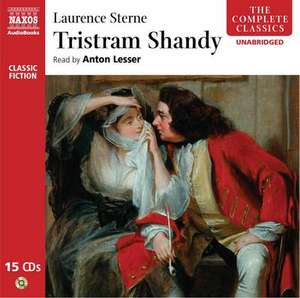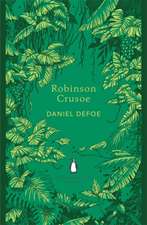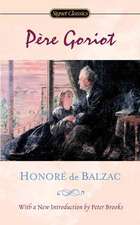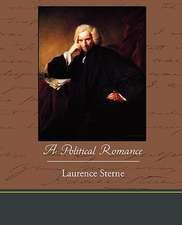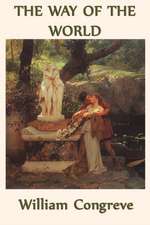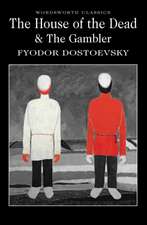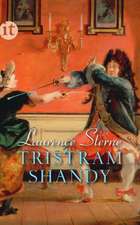Tristram Shandy: Classic Fiction
Autor Laurence Sterneen Limba Engleză Audio – 30 iun 2009
Vezi toate premiile Carte premiată
Audies (2010)
| Toate formatele și edițiile | Preț | Express |
|---|---|---|
| Paperback (4) | 27.76 lei 3-5 săpt. | +12.30 lei 6-12 zile |
| Wordsworth Classics – 29 feb 1996 | 27.76 lei 3-5 săpt. | +12.30 lei 6-12 zile |
| CREATESPACE – | 49.27 lei 3-5 săpt. | |
| Penguin Books – 24 oct 2012 | 57.71 lei 21-33 zile | +26.71 lei 6-12 zile |
| CREATESPACE – | 101.09 lei 6-8 săpt. | |
| Hardback (1) | 104.38 lei 21-33 zile | |
| EVERYMAN – 25 sep 1991 | 104.38 lei 21-33 zile |
Din seria Classic Fiction
-
 Preț: 40.19 lei
Preț: 40.19 lei -
 Preț: 49.88 lei
Preț: 49.88 lei -
 Preț: 49.88 lei
Preț: 49.88 lei -
 Preț: 148.26 lei
Preț: 148.26 lei -
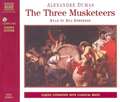 Preț: 113.72 lei
Preț: 113.72 lei - 15%
 Preț: 520.62 lei
Preț: 520.62 lei -
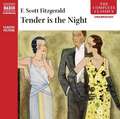 Preț: 223.38 lei
Preț: 223.38 lei -
 Preț: 71.31 lei
Preț: 71.31 lei -
 Preț: 182.71 lei
Preț: 182.71 lei -
 Preț: 145.80 lei
Preț: 145.80 lei -
 Preț: 147.22 lei
Preț: 147.22 lei -
 Preț: 441.56 lei
Preț: 441.56 lei -
 Preț: 261.33 lei
Preț: 261.33 lei
Preț: 427.83 lei
Preț vechi: 445.66 lei
-4% Nou
Puncte Express: 642
Preț estimativ în valută:
72.24€ • 77.24$ • 60.23£
72.24€ • 77.24$ • 60.23£
Indisponibil temporar
Doresc să fiu notificat când acest titlu va fi disponibil:
Se trimite...
Preluare comenzi: 021 569.72.76
Specificații
ISBN-13: 9789626349670
ISBN-10: 9626349670
Dimensiuni: 137 x 62 x 137 mm
Greutate: 0.48 kg
Editura: NAXOS Audiobooks
Seria Classic Fiction
Locul publicării:Hong Kong
ISBN-10: 9626349670
Dimensiuni: 137 x 62 x 137 mm
Greutate: 0.48 kg
Editura: NAXOS Audiobooks
Seria Classic Fiction
Locul publicării:Hong Kong
Recenzii
Naxos audiobooks has just released an unabridged version, read by Anton Lesser with humour and brio. Lesser's light tenor is perfectly suited to the many roles (Parson Yorick, Doctor Slop, et al) who crowd Sterne's narrative. This translates into 15 CDs and about 19 hours of listening. Perfect for a wet summer. -- Robert McCrum, The Observer. This extraordinary novel - precursor of post-modernism by 250 years - would be an unwieldy beast in unabridged form: its 19 hours of whim and wit would be indigestible , if swallowed whole. But at a gentle pace it makes a lovely listen, as Anton Lesser brings characters and situations to life in infectiously unbuttoned style. Massive books like Sterne's don't fit modern lifestyles, but this massive audio-book may well fit in very well. -- Betty Tadman, The Scotsman As a general rule I go along with the advice that if a book doesn't grab you by the end of chapter 4, don't waste your time, there are plenty more. Yes, but not like Tristram Shandy. Nothing I've ever come across is like Sterne's extraordinary comic tour de force published 250 years ago which, I freely admit, I found pretty hard going a long way past chapter 4. And then, suddenly, I got it. Or at least I realised I was coming at it from the wrong direction. It isn't a novel. It has no plot. Chapters break off in mid-sentence because, advises the narrator, 'I would not give a groat for that man's knowledge in pen-craft who does not understand this: That the best plain narrative in the world, tacked very close to the last spirited apostrophe to my Uncle Toby, would have felt both cold and vapid upon the reader's palate; therefore I forthwith put an end to the chapter, though I was in the middle of my story.' And which story might that have been? The one about Uncle Toby's dalliance with the widow Wadman? Or his manservant Corporal Trim's tireless reconstructions of Flanders campaigns, complete with battering rams and catapults on the bowling green behind the vegetable garden? Or of Dr Slop, summoned to assist at the narrator's birth, being thrown from his horse and ... Enough. If you've ever sat spellbound listening to a witty, satirical, outrageous, digressive raconteur regaling you with endless stories about preposterous characters that lead nowhere but keep you hanging on every word, trust me - they learned their craft from Sterne. So did postmodernists such as James Joyce and Flann O'Brien. It is tailor-made for audio, as is Anton Lesser's reading - intelligent, humorous, charming. Dr Johnson admired the book enormously, but opined that 'nothing odd will do long'. For once he was wrong. Tristram Shandy is decidedly odd and extremely long, but it has stayed the course. -- Sue Arnold, The Guardian When I'm in London during the summer, I don't have the car. This is liberating to an extent, but does mean that I can't listen to Tristram Shandy. I bought the unabridged 15-CD set at the best possible place - Shandy Hall, Laurence Sterne's home at Coxwold, in Yorkshire.
On visiting, I became uncomfortably aware that I'd never managed to get through any Sterne. Anton Lesser reads Tristram to perfection. By the time I'd driven back to Ramsgate the next day, I had heard 10 CDs, but what about the remainder? My ears are the wrong shape for an iPod; the little earphones fall out. I can't expect the family to share Sterne in the car. Besides, is he suitable for children?
Eventually, they may take to him more quickly than me always going off at a tangent, with no obvious beginning, middle and end, Tristram should appeal to the internet generation. -- Clive Aslet, Town Mouse Country Life
Notă biografică
Born
in
Clonmel,
Ireland,
in
1713,
Laurence
Sterne
spent
the
first
ten
years
of
his
life
moving
from
place
to
place
within
Ireland
and
also
Yorkshire,
as
his
father,
an
army
ensign,
was
assigned
and
reassigned
constantly.
Educated
at
a
grammar
school
near
Halifax,
Sterne
took
a
place
at
Jesus
College,
Cambridge
in
1733,
two
years
after
his
father
died
of
a
fever
in
Jamaica.
Going
on
to
become
a
clergyman,
he
published
four
sermons
during
his
lifetime
-
but
it
was
for
his
literary
works
that
he
earned
great
acclaim,
particularlyThe
Life
and
Opinions
of
Tristram
Shandy,
his
nine-volume
masterpiece,
which
made
him
a
celebrity.
Dogged by ill-health for much of his life, he took various recuperative trips to the continent, which informed his final work,A Sentimental Journey, published barely three weeks before his death in London in 1768 at the age of fifty-four.
Dogged by ill-health for much of his life, he took various recuperative trips to the continent, which informed his final work,A Sentimental Journey, published barely three weeks before his death in London in 1768 at the age of fifty-four.
Premii
- Audies Finalist, 2010
